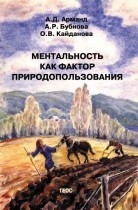
Арманд А.Д., Бубнова А.Р., Кайданова О.В. Ментальность как фактор природопользования. М.: ГЕОС, 2013. 158 c.
Предлагаемая читателю книга посвящена не новой теме: проблеме взаимодействия человека с окружающей его природной средой. Но в данном случае максимум внимания уделяется роли коллективного сознания в практике природопользования. С этой точки зрения рассматриваются исторические корни мировоззрения, сложившегося у ряда народностей, населяющих современную Россию, включая русских (гл. 2). Далее внимание направлено на трансформацию экологических представлений жителей под влиянием мировых религий, марксистского учения, а также рыночной идеологии (гл. 3). Для оценки современного состояния природоохранных представлений разных групп людей были проведены социологические исследования (анкетные опросы в местах расселения татар-мишарей, вепсов, мордвы, марийцев, русских), результаты которых изложены в гл. 4. Получено заключение о значительной устойчивости и периодических трансформациях в некоторые критические моменты истории «социальных эстафет»
дружелюбного, бережного отношения к природной среде. Катастрофические разрушения эстафет происходят в наши дни (гл. 5).
Книга должна вызвать интерес у экологов, психологов, социологов, студентов естественнонаучных специальностей и всех, кого волнуют проблемы охраны природы и судьба малых народов в современном мире.
Издание осуществлено при финансовой поддержке Российского фонда фундаментальных исследований по проекту 13-05-07033.
Armand A.D., Bubnova A.R., Kaidanova O.V. Tradition as a Factor of Land use. – M.: GEOS, 2013. – 158 p.
The book, suggested to the readers, is devoted to the problem, which is not new: how do the human beings interact with the natural environment. But in this case, maximum attention is payed to the role of collective human consciousness in the land use practice. The historical roots of ideology of the nationalities of the Russian Federation living nowadays, including the Russians, are examined from this point of view (chapter 2). Then the text describes the transformation of the ecological traditions of the populations under the infl uence of the world religions, the Marxist ideology and also the market economic ideology (chapter 3). The sociological explorations were held among the different groups of people in order to reveal the ideas connected with the conservation of the nature environment. The questionnaire was spread in the localization areas of the Tartars (the Mishars), the Veps people, the Mordvinians, the Mari people, the Russians). The
results are represented in chapter 4. The conclusion is, that the traditions of the “social handing the baton to the next generation” are stable enough. But they can periodically be transformed during some critical moments of the history (meaning the traditions of taking care of the nature). The catastrophic destructions of the “social handing the baton” come nowadays (chapter 5).The book must arouse interest in the subject to ecological specialists, psychologists, sociologists, students of natural sciences and for all, who are interested in the conservation of the nature and want to know more about the little nationalities.

